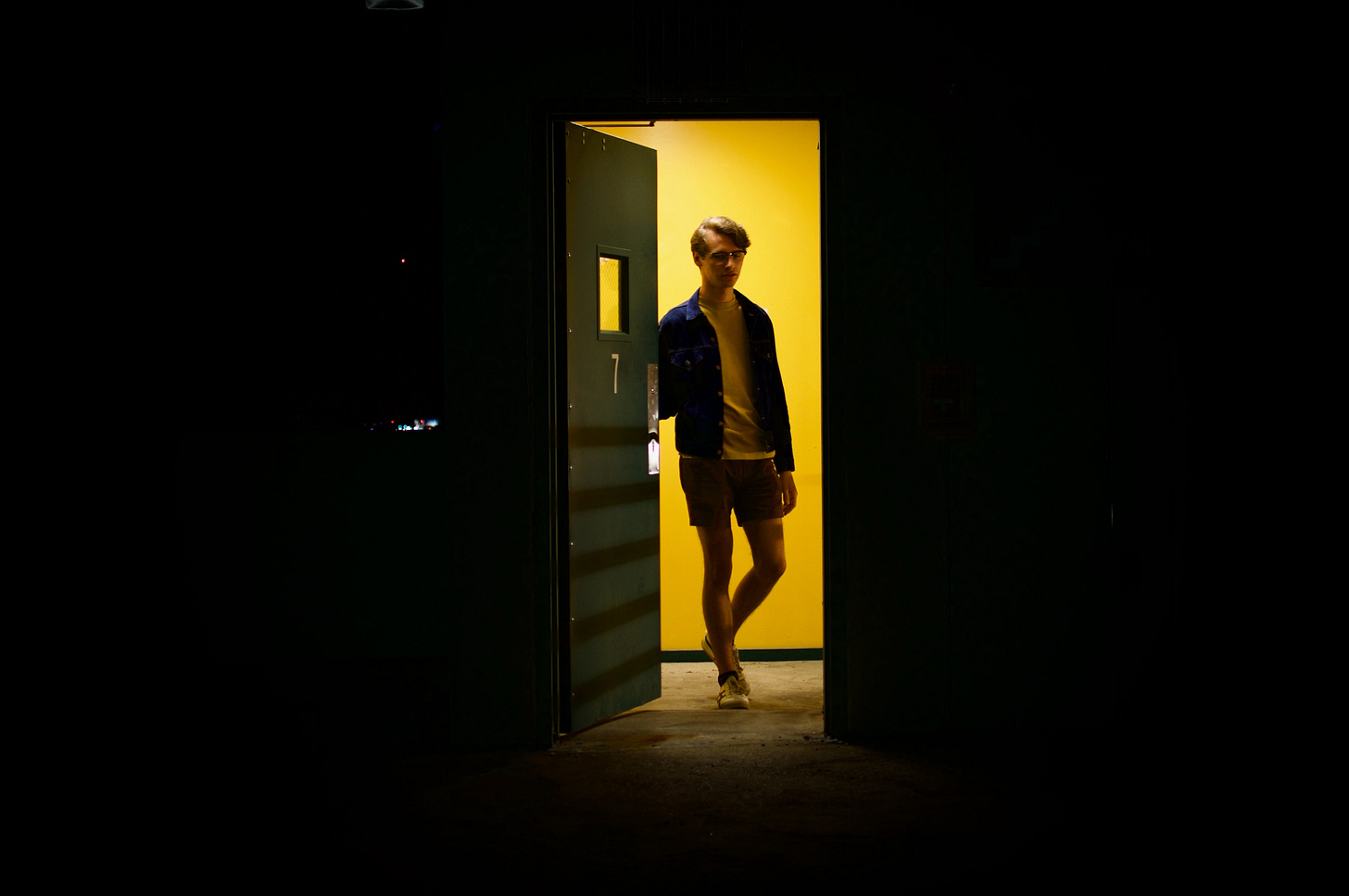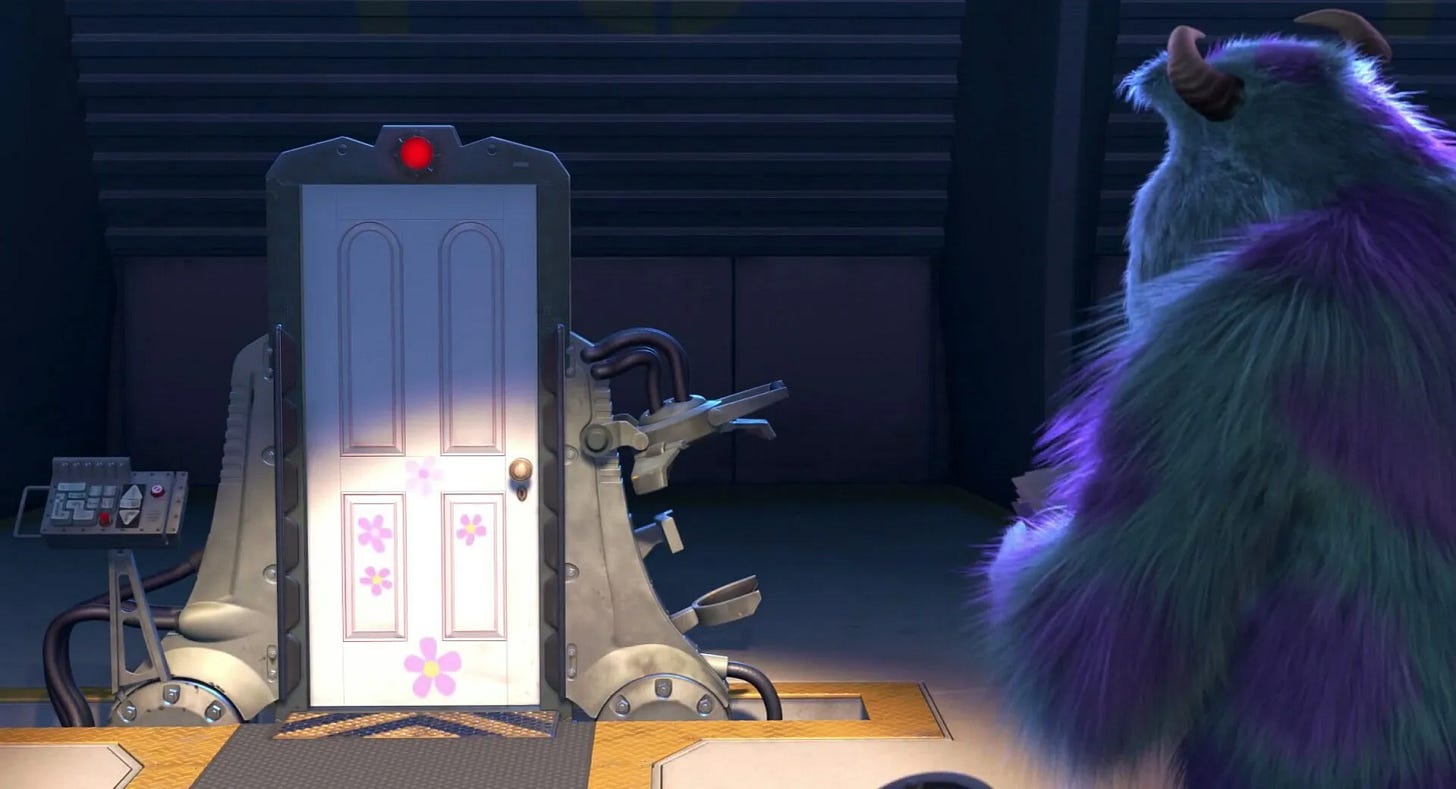When You Were Little...
Creativity and Embracing Unlived Lives
This is an ode to mid-life. How turning to creativity can help us navigate the claustrophobia and grief of mid-life. If you know… you know…
When you were little, you dreamed of being a great number of things: a princess, a fireman, a policewoman, a doctor, an astronaut, a veterinarian, and a construction worker. In your mind's eye, you could become these people as easily as you could change your clothes. One day, this. One day, that. Even on the same day, even at the same time, you could be all of them.

When you were not so little, but not yet big enough, you dreamed of being a number of things, perhaps fewer and more select than before: a doctor or a lawyer or a diplomat or a businesswoman. These "people-to-be" became distinct and separate categories that could only be tried on one at a time. You knew more of the world to understand that likely you could only be one "when you grow up" and in fact that being that one thing, being an expert at it, was desirable.
When you became old enough for your first job - at the grocery store, say - you spent your time stocking shelves or checking out patrons dreaming of "anything but this," with the mantra "I'm definitely not doing this thing when I grow up" on repeat. You focused on making sure you put yourself on a path to making more than a handful of dollars an hour. Still, your dreams were not yet tethered to reality. They may in fact have been inflated and dramatic, particularly in opposition to your current misery as a teenager with no income, a ton of hormones, and no car. You dreamed of being a famous artist, a runway model, a professor, an inventor, a politician, the next famous YouTuber or TikTok Influencer.
When you became old enough to leave home or were forced to leave home before you were ready, you had to make some choices. How would you make money? Where could you afford to live? If you're one of the lucky few, what major should you declare? You might also have wondered what could you do that would make you money and bring happiness? Most of us decide at this point that we have to make compromises. The dreams we had for ourselves aren't accessible, available, or plausible. Reality comes bounding in dictating what's possible, saying, "You can do this or that but none of those things" (pointing to all of the other things you had dreamt of being or doing).
At some point, you made enough choices to have cleared a distinct path leading in a particular direction towards a specific place. Year after year, every choice became one step closer to that place. Necessarily so, there were fewer possible outcomes. In pursuit of the dream that would make you enough money to be independent, a compromise we all have to make at some point, some quicker than others, you have no choice but to slough off the old dreams, double-down, and focus. You narrow your options. You work your way through the apprenticeships, the jobs, the career path. You might falter once, or twice, or thrice and need to step off your current track to a different one to continue moving forward. You make choices that continue to position you ever more specifically in a place: a geography, a social sphere, an economic strata, a cultural milieu, a trade, a profession.

By mid-life, you have positioned yourself so specifically that you might begin to feel a great amount of pride in what you have accomplished. Or, you might lament that you didn't achieve what you had hoped, even within the confines of reality. Life might feel unfair, limited, and cruel. The real world bears no resemblance to the one you were told about nor does it look anything like what you dreamed. Life tragedies, illnesses, sicknesses may have severely constricted your ability to get anywhere near your dreams. You might wonder whether you are the one at fault, that you are broken, or just not good enough.
The room of our life
We all have a room that we live in that is our life. As a child, your room had many doors leading to undiscovered hallways with secret passageways to great ballrooms and elaborate gardens. As many doors as you could imagine opened to all of your possible lives that you could lead in the future.
Now, as an adult, your room has been molded by reality, by circumstances, by choices made for you or by you. Consider that you might now just have two actual doors (and if you are lucky at least one window).
You know what is behind each door. Behind Door Numero Uno, there is a narrow hallway with other doorways full of obligations to meet, responsibilities to uphold, and a reputation to protect. They are all known to you. They are there because you chose them and/or they chose you.
This room that was formed over years and years of choices might start to feel claustrophobic to you. You might keep looking for more doors, only to realize that there aren't any left to open. Except Door Number Two.
Behind Door Number Two is a closet full of boxes, hats, clothing, old record collections, mixed tapes, picture albums, and toys. These are stowed away pieces of your old self; reminders of your past life and your past self's future dreams. You might keep these things as mementos of who you were or who you wanted to be. You might also keep these things as bookmarks, reminders of where you left off one day and a place to pick up again when you have more time. You might keep these things so that every now and then when you aren't off meeting the demands of life, attending to work obligations or cleaning up family crises you can try them on again or play with them.
It might be some time since you have opened the closet. You might choose to visit the closet regularly. If you're lucky, you might have built quite a large and elaborate walk-in closet at a young age, full of hobbies and interests. Even so, at this age of "adulting", you might choose not to look inside anymore. Perhaps you rarely go in the closet anymore because it makes you sad. Or, perhaps you go in when no one is looking, set up your old Atari and play games for hours. Or maybe you turn on a light and paint for hours. When someone calls for you from far away down the hall beyond Door Numero Uno, you call out in a voice of veiled irritation: "Just a minute, I'm busy, I'll be right with you, working on something important in here!" You quickly splash paint everywhere in one final-last-God-forsaken-minute-that-feels-like-it-might-be-the-last-one-forever before you go attend to “real life.”

If you are like me, you might also sit there for hours on end at the entrance to your closet (when you “should be doing other things”), with your old dreams, loves, and lives strewn all around you, pouring over them, holding them, crying over them. There are so many unlived lives in that closet, you think. If only I had enough time. If only I could have... If only I could still…
Meanwhile, the door of obligations stares you down chiding you for wasting your time. That terrible door. It's terrible for one or many reasons: it's the one you used to be proud of, the one that you felt backed into, the only one that seemed available at the time, the one that held so many promises but now provides barely enough to live on. It is now the only door left. You try to make the best of it. It’s yours after all. Besides, you can't imagine how you could bust through or tear down your walls entirely to make a new door. It's too expensive, there's not enough time, the whole house might come down. It’s too late.
Don’t forget the window
The closet is important. But you need the window. I forgot about my own window until a few years ago. It's been there from the very beginning as the portal to your imagination. You used it regularly as a child. You stared out of it for hours, imagining all of the lives you could live. Now, as an adult, when there are fewer doors to open, fewer possibilities in life, you still have that window.

So, you start to find some time here and there, perhaps while wearing your fireman hat or your princess tiara that you pulled from the closet, to peer out the window. You notice the trees, the sky, the clouds. You notice birds if you are lucky to live in a place where there are any left. You hear the sounds of whatever might be on the other side of that window. You imagine. You start to create. You might write, you might dance, you might art, you might read. You might create. You might create A LOT.
For it is in the creating, in the imagination, represented by this window, that new worlds and lives are born. It's in our imaginative selves that even a place where our unlived lives, the dreams we once held dear and then discarded, can come back to life and be explored. We can write ourselves into new stories that are not limited by a budget, a wage income, a failed marriage, an inordinate amount of debt that you will never pay off and may even leave to your children. We can read ourselves into stories that give us access to new ways of thinking, being and relating to that world that we created for ourselves behind Door Numero Uno.
We always have another way out, even when the world tells us we do not have one. That other way out just happens to be another way in, through imagination, to ourselves. The more the walls of life seem to be closing in or the number of doors seem to be fading or disappearing, the more we are invited to use our imagination, to create, to find ourselves, to go inwards. It's not always easy to do so. Sometimes, we feel guilty for spending the time. Sometimes looking out into ourselves through the window, particularly during a storm or at night, can be threatening. For what is a window other than a pane of glass or two. It’s both transparent and reflective.
An Ode to Midlife
This is my ode to midlife, to my closet of unlived lives and the window of my imagination. In those times when I can't bear to open Door Numero Uno, I go to the closet and bring my old things out. I rearrange them, I hug them, I hang them up, I decorate the room with all of the things that are me and of me. I set up a comfortable chair in front of the window, grab some binoculars, a good pen and a nice journal or sketchbook and I look out the window into myself. Or, instead, I choose to pick up a book which is another person's window into other lives and selves.
There, there in our own creations or in those of others are limitless, boundless, infinite lives to consider, to explore and - if we have enough of that childlike imagination left in us - to live.
This essay has been on my mind for weeks and was inspired by a few things:
my mid-life melancholy which seems to run hot then cold then hot again, and has been doing so for YEARS.
a fantastic post about portals by Amy Cowen of Illustrated Life.
my recent read of Mrs. Dalloway and then watching The Hours and crying through it. If you read the book a long time ago when you were young and now you are in “mid-life”, I highly recommend a re-read.
my Jungian psychotherapist who introduced me to the concept of “unlived lives” and why so much of mid-life melancholy is about grieving the loss of lives we once dreamed of living.
my NaNoWriMo experience of writing a story called "The Unlived Lives of Tanner Fields."
writing short stories about drawing one’s self home and finding the still middle in the midst of crisis. In every story I write, I’m looking through the window externally to work something out internally.
a post from earlier this year where I wondered about the psychological benefits of spending hours creating and consuming art.
I invite you to share your thoughts, dreams, and reactions. What about this post resonated with you? If you have mid-life melancholy, you’re not the only one! I wrote this post to remind myself of that and remind you, too, in case you find yourselves in your room all alone feeling like there is no way out.





"We all have a room that we live in that is our life. As a child, your room had many doors leading to undiscovered hallways with secret passageways to great ballrooms and elaborate gardens. As many doors as you could imagine opened to all of your possible lives that you could lead in the future." A beautiful rumination on these doors and how we perceive them through the years.... I love the importance of the window. I don't think I draw much on "imagination," but I definitely think the windows are important.
I've been planning to finally "actually" read Mrs. Dalloway ever since you mentioned it a while back. It will have to be part of my list for January. Thank you for the shout-out, too. I really appreciate it.
I absolutely love your observation that a window is both reflective and transparent. Wow. There is so much inside that observation and it lit my mind up! Beautiful writing. So glad we've found each other's work!